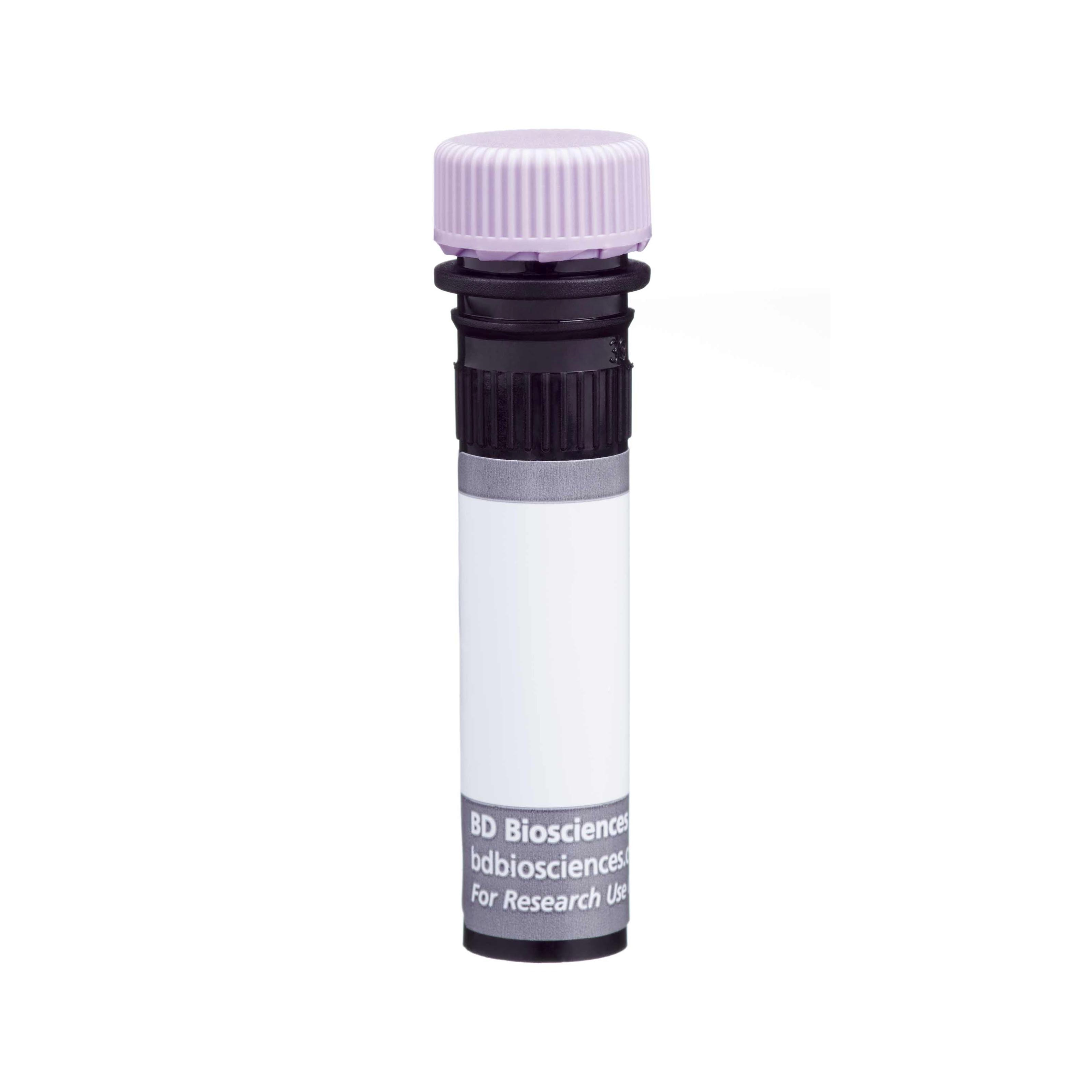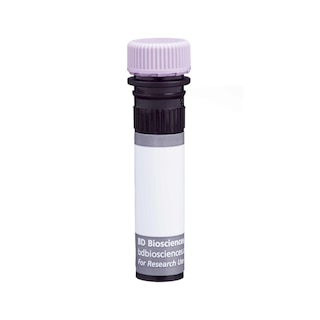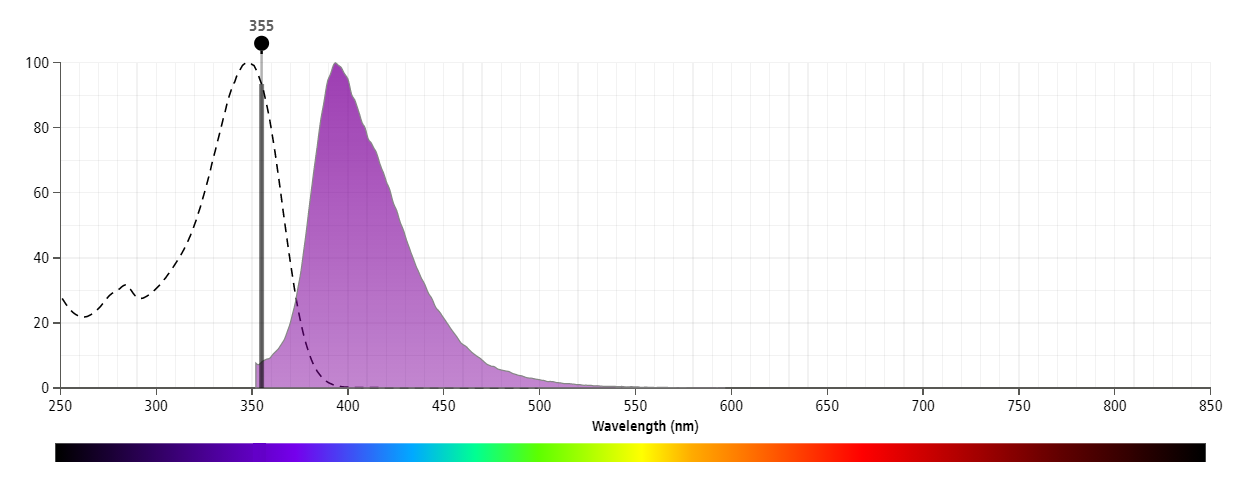Old Browser
Looks like you're visiting us from {countryName}.
Would you like to stay on the current country site or be switched to your country?


Regulatory Status Legend
Any use of products other than the permitted use without the express written authorization of Becton, Dickinson and Company is strictly prohibited.
Preparation And Storage
Recommended Assay Procedures
For optimal and reproducible results, BD Horizon Brilliant Stain Buffer should be used anytime two or more BD Horizon Brilliant dyes (including BD OptiBuild Brilliant reagents) are used in the same experiment. Fluorescent dye interactions may cause staining artifacts which may affect data interpretation. The BD Horizon Brilliant Stain Buffer was designed to minimize these interactions. More information can be found in the Technical Data Sheet of the BD Horizon Brilliant Stain Buffer (Cat. No. 563794).
Product Notices
- This antibody was developed for use in flow cytometry.
- The production process underwent stringent testing and validation to assure that it generates a high-quality conjugate with consistent performance and specific binding activity. However, verification testing has not been performed on all conjugate lots.
- Researchers should determine the optimal concentration of this reagent for their individual applications.
- An isotype control should be used at the same concentration as the antibody of interest.
- Caution: Sodium azide yields highly toxic hydrazoic acid under acidic conditions. Dilute azide compounds in running water before discarding to avoid accumulation of potentially explosive deposits in plumbing.
- For fluorochrome spectra and suitable instrument settings, please refer to our Multicolor Flow Cytometry web page at www.bdbiosciences.com/colors.
- Please refer to www.bdbiosciences.com/us/s/resources for technical protocols.
- BD Horizon Brilliant Stain Buffer is covered by one or more of the following US patents: 8,110,673; 8,158,444; 8,575,303; 8,354,239.
- BD Horizon Brilliant Ultraviolet 395 is covered by one or more of the following US patents: 8,158,444; 8,575,303; 8,354,239.
Companion Products






The OX-61 monoclonal antibody specifically recognizes a type II transmembrane glycoprotein, CD26, which is a serine exoprotease identified as dipeptidyl/peptidase IV. Among various biological activities, rat CD26 binds fibronectin and collagen. Rat CD26 is involved in the costimulation of thymocyte proliferation in vitro, particularly the CD4-/CD8- subset, and is developmentally regulated on hematopoietic cells. Although mouse and human CD26 anchor ADA (adenosine deaminase) to cell membranes, rat CD26 does not function as an ADA-binding protein. Rat CD26 is expressed in lung endothelial cells, as well as in various epithelial cells. T cells express lower levels of CD26 than CD4-/CD8- thymocytes. The distribution of CD26 antigen in rat bone marrow cells is similar to that of human CD26. OX-61 monoclonal antibody stains CD4+, CD8+, and Ig+ lymphocytes, and the staining increases upon activation.
The antibody was conjugated to BD Horizon™ BUV395 which is part of the BD Horizon Brilliant™ Ultraviolet family of dyes. This dye has been exclusively developed by BD Biosciences to have minimal spillover into other detectors, making it an optimal choice for multicolor flow cytometry. With an Ex Max at 348 nm and an Em Max at 395 nm, BD Horizon BUV395 can be excited with a 355 nm laser and detected with a 379/28 filter.

Development References (8)
-
Bristol LA, Sakaguchi K, Appella E, Doyle D, Takacs L. Thymocyte costimulating antigen is CD26 (dipeptidyl-peptidase IV). Costimulation of granulocyte, macrophage, and T lineage cell proliferation via CD26. J Immunol. 1992; 149(2):367-372. (Biology). View Reference
-
Gorrell MD, Wickson J, McCaughan GW. Expression of the rat CD26 antigen (dipeptidyl peptidase IV) on subpopulations of rat lymphocytes. Cell Immunol. 1991; 134(1):205-215. (Clone-specific: Immunohistochemistry, Immunoprecipitation). View Reference
-
Hanski C, Huhle T, Gossrau R, Reutter W. Direct evidence for the binding of rat liver DPP IV to collagen in vitro. Exp Cell Res. 1988; 178(1):64-72. (Biology). View Reference
-
Iwaki-Egawa S, Watanabe Y, Fujimoto Y. CD26/dipeptidyl peptidase IV does not work as an adenosine deaminase-binding protein in rat cells. Cell Immunol. 1997; 178(2):180-186. (Biology). View Reference
-
Johnson RC, Zhu D, Augustin-Voss HG, Pauli BU. Lung endothelial dipeptidyl peptidase IV is an adhesion molecule for lung-metastatic rat breast and prostate carcinoma cells. J Cell Biol. 1993; 121(6):1423-1432. (Biology). View Reference
-
Kameoka J, Tanaka T, Nojima Y, Schlossman SF, Morimoto C. Direct association of adenosine deaminase with a T cell activation antigen, CD26. Science. 1993; 261(5120):466-469. (Biology). View Reference
-
McCaughan GW, Wickson JE, Creswick PF, Gorrell MD. Identification of the bile canalicular cell surface molecule GP110 as the ectopeptidase dipeptidyl peptidase IV: an analysis by tissue distribution, purification and N-terminal amino acid sequence. Hepatology. 1990; 11(4):534-544. (Immunogen: Immunohistochemistry, Immunoprecipitation, Western blot). View Reference
-
Piazza GA, Callanan HM, Mowery J, Hixson DC. Evidence for a role of dipeptidyl peptidase IV in fibronectin-mediated interactions of hepatocytes with extracellular matrix. Biochem J. 1989; 262(1):327-334. (Biology). View Reference
Please refer to Support Documents for Quality Certificates
Global - Refer to manufacturer's instructions for use and related User Manuals and Technical data sheets before using this products as described
Comparisons, where applicable, are made against older BD Technology, manual methods or are general performance claims. Comparisons are not made against non-BD technologies, unless otherwise noted.
For Research Use Only. Not for use in diagnostic or therapeutic procedures.
Report a Site Issue
This form is intended to help us improve our website experience. For other support, please visit our Contact Us page.